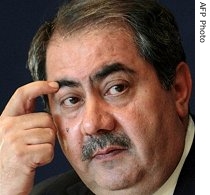-
(单词翻译:双击或拖选)
Sharm El-Sheikh, Egypt
04 May 2007
There was a rare mid-level meeting Friday between Iranian and U.S. diplomats1 at an international conference on Iraq. But at the same meeting, Iran's foreign minister has blasted the U.S. policies in the Middle East, and the hostility2 between the two countries has largely overshadowed the work of the conference aimed at stabilizing3 Iraq. VOA Correspondent Challiss McDonough is in Sharm el-Sheikh, where the meeting took place, and she has this report.
Iraqi officials had hoped that the top diplomats from Iran and the United States might meet for the first time in many years on the sidelines of the conference, but that did not happen. There was an ambassador-level meeting instead.
 |
| Hoshyar Zebari gestures during a press conference at the international conference on Iraq, 04 May 2007 |
"I don't know what went on in that meeting, but I think it was a positive sign that such a thing did take place while we are here," he said. This is a process, I think. It needs more work. There is a lot of suspicion, there is a lot of mistrust."
"But it is in my country's interest really to see a reduction of this tension. I need a conducive4 supportive regional environment for us, for my government to work, to be able to succeed," he continued.
Iran and the United States severed5 diplomatic relations in 1980, and talks of any sort between the two countries are exceedingly rare.
The two exchanged pleasantries over lunch Thursday and were supposed to sit at the same table at dinner Thursday night. Their seats were directly across from each other.
But Iranian Foreign Minister Manouchehr Mottaki left without eating, blaming his early exit on some unspecified violation6 of Islamic law.
Mottaki was harshly critical of the United States in both his final remarks to the conference delegates and at his news conference later. He said, "The United States must accept the responsibilities arising from the occupation of Iraq," and should not point fingers elsewhere.
He said, "This unilateral policy, this arrogant7, one-sided policy is the main reason for what is going on in Iraq today." He said other nations, intellectuals and even the American people believe the U.S. is pursuing the wrong policy in Iraq. He said, "In such a situation we have to say the policies have failed, and try to correct these policies."
For her part, U.S. Secretary of State Condoleezza Rice said she considered it a "breakthrough" to have the United States in the same room with all of Iraq's neighbors.
"I reassured8 the Iraqi foreign minister when we talked about it that the United States has no desire to have anything contribute to a more difficult set of circumstances for Iraq," she said. "We want Iraq's neighbors to behave in a way that is consistent with a democratic and stable Iraq. That's why this conference was convened9."
The diplomatic interplay between Iran and the United States largely overshadowed the developments of the final day of the Iraq conference.
Iraqi leaders discussed improving security and restoring stability in a landmark10 meeting with all of Iraq's neighboring countries, as well a host of other international organizations, including the United Nations, members of the G-8 group of industrialized nations and the European Union.
In his final remarks, Iraqi Prime Minister Nouri al-Maliki said he would not allow terrorist groups to consider Iraq a "safe haven," and he asked for support.
He said, "We call on neighboring countries of the region to prevent the infiltration11 of terrorist groups into Iraq and stop them from receiving funds, political support and media support."
On Thursday, the conference approved a new pact12 between Iraq and the international community, known as the International Compact on Iraq.
The document sets specific goals for Iraq's political reconciliation13, economic development and security improvement. In exchange, the other nations taking part agreed to a series of mostly financial commitments to support those goals.
 收听单词发音
收听单词发音
1
diplomats

|
|
| n.外交官( diplomat的名词复数 );有手腕的人,善于交际的人 | |
参考例句: |
|
|
|
2
hostility

|
|
| n.敌对,敌意;抵制[pl.]交战,战争 | |
参考例句: |
|
|
|
3
stabilizing

|
|
| n.稳定化处理[退火]v.(使)稳定, (使)稳固( stabilize的现在分词 ) | |
参考例句: |
|
|
|
4
conducive

|
|
| adj.有益的,有助的 | |
参考例句: |
|
|
|
5
severed

|
|
| v.切断,断绝( sever的过去式和过去分词 );断,裂 | |
参考例句: |
|
|
|
6
violation

|
|
| n.违反(行为),违背(行为),侵犯 | |
参考例句: |
|
|
|
7
arrogant

|
|
| adj.傲慢的,自大的 | |
参考例句: |
|
|
|
8
reassured

|
|
| adj.使消除疑虑的;使放心的v.再保证,恢复信心( reassure的过去式和过去分词) | |
参考例句: |
|
|
|
9
convened

|
|
| 召开( convene的过去式 ); 召集; (为正式会议而)聚集; 集合 | |
参考例句: |
|
|
|
10
landmark

|
|
| n.陆标,划时代的事,地界标 | |
参考例句: |
|
|
|
11
infiltration

|
|
| n.渗透;下渗;渗滤;入渗 | |
参考例句: |
|
|
|
12
pact

|
|
| n.合同,条约,公约,协定 | |
参考例句: |
|
|
|
13
reconciliation

|
|
| n.和解,和谐,一致 | |
参考例句: |
|
|
|















